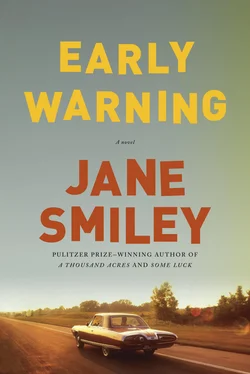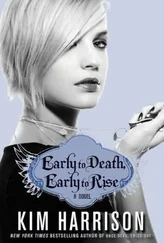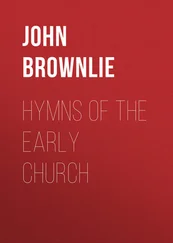Jane Smiley - Early Warning
Здесь есть возможность читать онлайн «Jane Smiley - Early Warning» весь текст электронной книги совершенно бесплатно (целиком полную версию без сокращений). В некоторых случаях можно слушать аудио, скачать через торрент в формате fb2 и присутствует краткое содержание. Год выпуска: 2015, Издательство: Knopf, Жанр: Современная проза, на английском языке. Описание произведения, (предисловие) а так же отзывы посетителей доступны на портале библиотеки ЛибКат.
- Название:Early Warning
- Автор:
- Издательство:Knopf
- Жанр:
- Год:2015
- ISBN:нет данных
- Рейтинг книги:5 / 5. Голосов: 1
-
Избранное:Добавить в избранное
- Отзывы:
-
Ваша оценка:
- 100
- 1
- 2
- 3
- 4
- 5
Early Warning: краткое содержание, описание и аннотация
Предлагаем к чтению аннотацию, описание, краткое содержание или предисловие (зависит от того, что написал сам автор книги «Early Warning»). Если вы не нашли необходимую информацию о книге — напишите в комментариях, мы постараемся отыскать её.
, a national best seller published to rave reviews from coast to coast.
Early Warning — читать онлайн бесплатно полную книгу (весь текст) целиком
Ниже представлен текст книги, разбитый по страницам. Система сохранения места последней прочитанной страницы, позволяет с удобством читать онлайн бесплатно книгу «Early Warning», без необходимости каждый раз заново искать на чём Вы остановились. Поставьте закладку, и сможете в любой момент перейти на страницу, на которой закончили чтение.
Интервал:
Закладка:
Lillian put Dean’s plate in front of him, then sat there, chin in hand, smiling, as he ate. He was methodical but thorough — she put her hand out and stopped him when he picked up the plate to lick it. She asked, “Did you skate well?”
“I let go of Daddy’s hands two times.”
“Good boy!”
“I was strong.”
“I know you are. Do you like it?”
Deanie nodded. Then he said, “Je swiss un bun garsson.”
Lillian said, “Oui!”
“Can I watch something?”
“You can go see what’s on.”
He got down from his chair and went into the playroom. Lillian took his plate to the sink. Outside, there were six boys now. Arthur formed them into two teams. The team to his left had to pat their stomachs with their right hands and rub their heads with their left hands. The team on the right had to pat their heads with their right hands and rub their stomachs with their left hands. It took about one minute to get everyone laughing and falling in the snow. Lillian laughed, too.
—
AFTER LESS THAN a semester at Berkeley, Henry decided that he hated the place. He did not want to believe that he was so shallow it bothered him that his clothes were slightly off, though how he experienced it was that everyone else’s clothes were slightly off — too aggressively casual, or dirty, or black, black, black. But perhaps they wore black because it was so cold all the time? Colder than Iowa — clammy, moldy, creeping into your joints, and the sunlight just for color. The landscape irritated him, too: up, down; up, down. The sky was very closed in, almost trapped. He kept his eyes on his feet.
The teachers and his fellow students always smiled after he told them where he’d done his undergraduate work. Henry knew what they were thinking: wasn’t it a relief to be here, in Berkeley, the promised land? He even had one teacher who spoke more slowly and clearly to him than to the other students — Professor Pradet, a man who had never heard of “Iowa.” And when he did well in Old English, that teacher always gave him extra praise, as if he were consistently exceeding expectations. In that class, two students had come from Harvard and one from Stanford; the only public-university graduate was from UCLA. In his Chaucer seminar, there was another outcast, Pat Clayton from Ohio State. But Pat wore the same clothes every day, was about to become a father, and talked only about rents, food prices, and the scarcity of jobs in medieval lit. Henry had nothing in common with him, either.
It didn’t help that, before Christmas, Rosa embarked upon a highly volatile romance with an older man (well, he was almost thirty to her twenty-two), named Neal Cassady, who was very handsome but also the sort of person whose life was a performance — or, you might say, a mess, Henry thought. Aunt Eloise disapproved, too, which may or may not have egged Rosa on. Henry said a small thing (“I see what you see in him, but what do you see in him?”) in an almost sincerely inquisitive tone of voice. Rosa slammed down the phone and didn’t speak to him for a month. Then Cassady went back to his wife, and Rosa called Henry to insist that Neal Cassady was nothing like her father, and if Heloise said one more Freudian word, Rosa would wring her neck. When Henry said, “That’s very Greek of you” (he was thinking of Electra, Orestes, etc.), she suddenly laughed, and then started crying and asked if he would go away for the weekend with her, because she couldn’t “stand it anymore.” He made himself pause as if hesitating before saying yes.
He thought he accepted that he and Rosa were not going to advance their own relationship past the epistolary stage. He had accepted that they were cousins, that there was scandal awaiting them if they went any further, and he had decided to see it as his particular fate that he should fall hopelessly in love with his cousin (but there was plenty of precedent in Romance literature for forbidden love, and maybe it was the least inconvenient kind). Once he moved from Iowa to California to be in the same city as Rosa, and had even moved to Rosa’s neighborhood, off Shattuck, he was forced to admit that she was hot-tempered, selfish, and not terribly neat. But he loved her even more, and could not sincerely turn down a chance to be with her. She said she would pick him up in twenty minutes.
Rosa was driving Eloise’s car, a gray Deux Chevaux that normally she laughed at. Henry had expected Rosa to look rumpled and distraught, but she looked normal. She leaned over to give him a peck on the cheek and peeled away from the curb, then zipped to Telegraph Avenue. When they turned south on Route 27, he remembered to ask where they were going. She said, “Carmel.” Henry perked up. Maybe his hatred of Berkeley was specific. California was as big as France, and, everyone said, as various. It was his own fault that he had not even gotten on a bus or a train and gone somewhere.
And, sure enough, soon he observed that the lie of the land south of the Peninsula was different from San Francisco, and the weather was warmer, too, brighter and drier. Beyond that, though, he could take no interest in the local language, history, geology, or products — he only had eyes for Rosa. The more normal she seemed (Did she usually smoke three cigarettes in an hour, or was he only noticing that now? Was she looking thinner? When he said something about Francis Drake repairing his ships in California, was she making a face?), the more he focused only on her. They walked Carmel Beach, a flat, golden expanse at the foot of a pleasant, clean town that was much more Spanish-looking than San Francisco; he stared so deeply into her face that he fell into a hole some child or dog had dug in the sand, and went to his knees. Rosa laughed for the first time in hours as she held out her hand to him. Maybe he was good for something, then, he thought.
She had money. They ate sole caught nearby for supper and went to a movie in downtown Monterey. Henry watched Rosa’s profile as she gazed at the screen. She seemed to follow the plot, but Henry only noticed that it was about Grace Kelly somewhere in South America.
The rooms at the hotel Rosa found in Carmel were small, fake adobe. Without commenting or seeming to notice that this was unusual, Rosa put on her pajamas and got into bed with Henry. She was so businesslike and quick that he hardly got a look at her breasts, her thighs, her derriere, but he tried to think that this was his dream come true. She pressed herself into his arms and fell asleep. But it was like nothing — worse than that, uncomfortable. Even though he felt the breeze from the open window on his forehead, he couldn’t disentangle himself from Rosa to get up and close it. It was strange to feel her breath on his neck, strange to sense the weight of her head pressing his arm into the unforgiving mattress, strange to feel her knee push between his legs, strange to take in her scent (she hadn’t bathed before getting into bed), a combination of salt and sweat and the detergent her pajamas had been laundered in. She slept like a rock — an unconscious weight tilting the bed, so that finally he had to ease backward, toward the wall, and contain and balance himself there all night, until Rosa woke up, sat up, and said that she had just been dreaming of waffles. After breakfast, Rosa said that she thought they should drive down the coast, but Henry said that he had an exam the next day and absolutely had to get back to school, to the library, and to something (he kept this part to himself) that he understood.
He did not look at her on the drive home, only out the window, and he decided that maybe California was as interesting in its way as everyone said it was.
—
LATELY, Joe Langdon kept wishing that he had a photograph of his father when Walter was thirty-three, the age Joe was now. What he would look at was not the hairline or the wrinkles, but the belly. When had Joe’s come on? He could not remember. His mother said he was getting to look more like Walter every year, but she was talking about worry lines between his eyebrows. She said, “Well, you had to be a farmer, didn’t you?” And he always said, “You could have married more commercial bloodlines,” and that shut her up for a day or two. He knew she knew he was referring to the Crests, who had the grocery store in town. Dan Crest was rumored to have had a crush on Rosanna, which was why he gave her more for her eggs and butter all through the Depression than he gave anyone else. Maybe the farming came from the Vogels — his grandmother Langdon cared so little about farming now that she had plowed under her rosebushes in case she got the money to go to Europe all of a sudden. His mother’s brothers, alive and dead, were as wedded to the land as Joe was, so who was Rosanna to talk?
Читать дальшеИнтервал:
Закладка:
Похожие книги на «Early Warning»
Представляем Вашему вниманию похожие книги на «Early Warning» списком для выбора. Мы отобрали схожую по названию и смыслу литературу в надежде предоставить читателям больше вариантов отыскать новые, интересные, ещё непрочитанные произведения.
Обсуждение, отзывы о книге «Early Warning» и просто собственные мнения читателей. Оставьте ваши комментарии, напишите, что Вы думаете о произведении, его смысле или главных героях. Укажите что конкретно понравилось, а что нет, и почему Вы так считаете.











